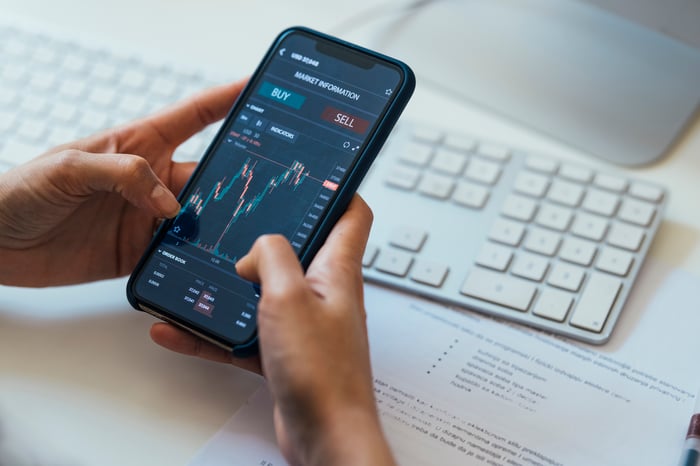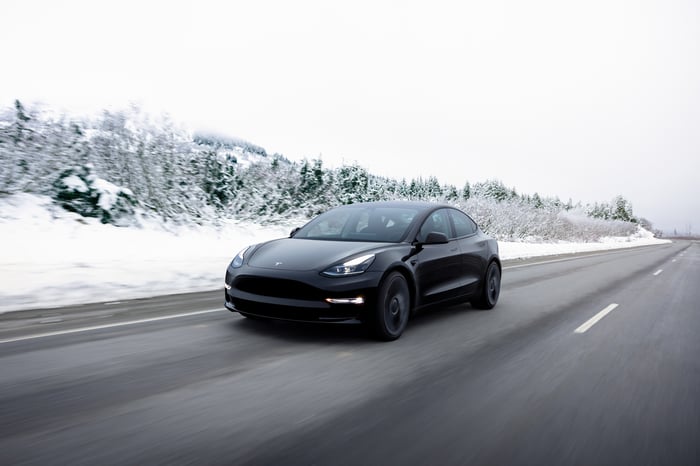|
|
|

|
|||||

|
|
The advent of the internet broke down information barriers between Wall Street and Main Street, which paved the way for the retail investor revolution.
Both Apple and Nvidia had, at one time, been the most held stocks on retail investor-dominated online trading platform Robinhood.
The current top holding on Robinhood has mouthwatering addressable markets ahead of it, but comes rife with red flags.
The advent and proliferation of the internet three decades ago was a watershed moment for corporate America and Wall Street. Aside from opening new doors for businesses to market and sell their products and services, the internet broke down barriers between Wall Street and Main Street.
In the 1980s, investors had to wait for the morning paper or tune into a financial news network for a glimpse at how their stock(s) performed in the latest session. If they wanted to peruse at a company's financial statements, annual reports needed to be mailed to prospective/existing shareholders.
Where to invest $1,000 right now? Our analyst team just revealed what they believe are the 10 best stocks to buy right now. Continue »

Image source: Getty Images.
With the internet, the information barrier was torn down. Retail investors had instant access to income statements, balance sheets, investor presentations, major financial headlines, and could buy and sell shares of stock online at the click of a button. Over time, retail investors have grown into a force on Wall Street, and online brokers have taken notice.
Robinhood (NASDAQ: HOOD) has become an especially popular online investing platform that's catered to everyday investors. Perks like commission-free trading for stocks on major U.S. exchanges, as well as the ability to buy fractional shares, have hit home with retail investors.
Something else noteworthy about Robinhood is its "100 Most Popular" leaderboard, which lists the 100 most held securities (stocks and exchange-traded funds) by members on its platform. The No. 1 holding by retail investors on Robinhood is a projected multi-industry leader looking at a $5 trillion addressable opportunity by 2050 in one of industries.
If there's one defining characteristic of Robinhood's retail investors, it's that they generally favor growth stocks and industry leaders. All seven members of the "Magnificent Seven" are among the top-14 holdings on the platform.
Roughly five years ago, Apple (NASDAQ: AAPL) was the No. 1 holding on Robinhood. Investors were attracted by the popular products they knew (iPhone), Apple's steady outperformance of the benchmark S&P 500 for more than a decade, and its top-notch management team, led by CEO Tim Cook.
More recently, artificial intelligence (AI) colossus Nvidia (NASDAQ: NVDA) spent a brief period atop the Robinhood leaderboard. Nvidia's graphics processing units (GPUs) are being overwhelmingly chosen as the "brains" of AI-accelerated data centers by businesses.
CEO Jensen Huang is sparing no expense to ensure his company maintains its compute advantages by bringing a new AI-GPU to market each year. Following the launch and ramp of Blackwell Ultra this year, Huang is expected to oversee the rollout of Vera Rubin and Vera Rubin Ultra in the second-halves of 2026 and 2027, respectively. Nvidia's sustained competitive edge in GPUs has afforded it exceptional pricing power and built up quite the order backlog.
But in spite of this dominance, Nvidia is currently the No. 2 holding on Robinhood, with Apple falling to the No. 3 spot. The most held stock on Robinhood right now has the distinction of dethroning both of these juggernauts.

Image source: Tesla.
For much of the past four years, the most held stock by retail investors on Robinhood has been Mag-7 member Tesla (NASDAQ: TSLA).
Most investors are familiar with Tesla as North America's leading electric-vehicle (EV) manufacturer. Tesla has delivered in the neighborhood of 1.8 million EVs in each of the last two years, and was the first auto company in more than a half-century to build itself from the ground up to mass production. It's also been profitable for five consecutive years, which is something no other pure-play EV maker can say.
But CEO Elon Musk has expanded his company's vision well beyond selling and leasing EVs. Tesla is ramping its energy generation and storage segment, expects to become a leader in self-driving robotaxis, and is developing Optimus, its line of humanoid robots.
According to a May-issued research note from Morgan Stanley, the humanoid robot addressable market can reach or exceed $5 trillion globally by 2050, making it a potentially larger opportunity than autos. Morgan Stanley's Adam Jonas, who's been a longtime Tesla bull, sees humanoid robots being used for repetitive tasks in the industrial sector, with technology advances reducing their cost over time.
While a multifaceted approach that sees Tesla evolve in EV sales, robotaxis, energy storage and generation, and humanoid robots sounds great on paper, it's rife with risks.
For starters, Tesla's competitive edge in EVs has been waning. Though it remains decisively profitable, it's reduced the sale price of its EV fleet on more than a half-dozen occasions over the last three years. These are clear signs that competitive pressures are mounting globally, and it's having an adverse impact on Tesla's vehicle margin.
Additionally, Tesla's profits aren't quite as strong as they appear. More than half of the company's pre-tax income can be traced to automotive regulatory credits and interest income earned on its cash. These are unsustainable and non-innovative income sources, as evidenced by President Donald Trump's "Big, Beautiful Bill" removing domestic automotive regulatory credits on Sept. 30.
However, the biggest investment risk with Tesla might just be its head honcho, Elon Musk. While there's no denying that Musk has moved Tesla beyond a sole reliance on EV sales, the overwhelming majority of Musk's promises go unfulfilled.
For example, Tesla's billionaire CEO has been claiming his company is "one year away" from Level 5 full-self driving (FSD) for 11 consecutive years, yet Tesla's FSD hasn't moved beyond Level 2. Musk also touted pre-sales of the Cybertruck, which ultimately fell flat. The final straw has been the geofenced launch of robotaxis in Austin, Texas. If Musk's promises are removed from Tesla's market cap and investors were to take a "show-me" approach, it's possible Tesla stock could lose most of its value.
While the No. 1 holding for Robinhood's retail investors has a sizable addressable market, its risks portend a bumpy ride.
Ever feel like you missed the boat in buying the most successful stocks? Then you’ll want to hear this.
On rare occasions, our expert team of analysts issues a “Double Down” stock recommendation for companies that they think are about to pop. If you’re worried you’ve already missed your chance to invest, now is the best time to buy before it’s too late. And the numbers speak for themselves:
Right now, we’re issuing “Double Down” alerts for three incredible companies, available when you join Stock Advisor, and there may not be another chance like this anytime soon.
*Stock Advisor returns as of September 22, 2025
Sean Williams has no position in any of the stocks mentioned. The Motley Fool has positions in and recommends Apple, Nvidia, and Tesla. The Motley Fool has a disclosure policy.
| Feb-28 |
Iran Says Khamenei Killed As U.S.-Israeli Attacks Continue; Dow Jones Futures Loom
AAPL
Investor's Business Daily
|
| Feb-28 |
Trump Says Khamenei Killed In U.S.-Israeli Attacks. How Will Dow Jones Futures React?
AAPL
Investor's Business Daily
|
| Feb-28 | |
| Feb-28 | |
| Feb-28 | |
| Feb-28 | |
| Feb-28 | |
| Feb-28 |
Trump Says Khamenei Likely Killed In U.S.-Israeli Attacks On Iran. How Will Dow Jones Futures React?
AAPL
Investor's Business Daily
|
| Feb-28 | |
| Feb-28 | |
| Feb-28 | |
| Feb-28 | |
| Feb-28 | |
| Feb-28 | |
| Feb-28 |
Join thousands of traders who make more informed decisions with our premium features. Real-time quotes, advanced visualizations, backtesting, and much more.
Learn more about FINVIZ*Elite